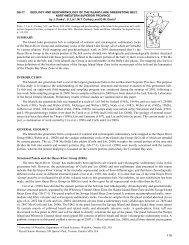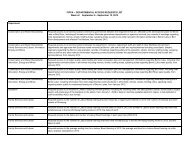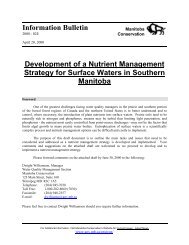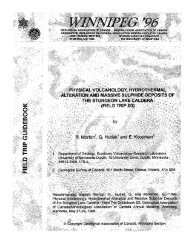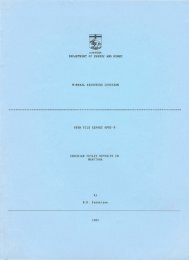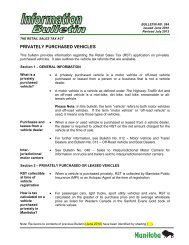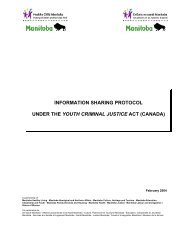Applying Manitoba's Water Policies - Government of Manitoba
Applying Manitoba's Water Policies - Government of Manitoba
Applying Manitoba's Water Policies - Government of Manitoba
Create successful ePaper yourself
Turn your PDF publications into a flip-book with our unique Google optimized e-Paper software.
<strong>Applying</strong> the <strong>Policies</strong><strong>Water</strong> Quality- providing easily accessible collection facilities forthe disposal or recycling <strong>of</strong> containers for pesticides,chemicals, and other environmentally hazardoussubstances; and- providing appropriate hazardous waste collectionand disposal facilities, and encouraging their use.• encourage research concerning:- sources <strong>of</strong> water pollutants and the effects <strong>of</strong> pollutantson human health and the environment;and- improved technology and management practicesdirected at reducing water pollution.• enter into agreements with the federal governmentand neighbouring provinces and states concerningmeasures to protect water quality in trans-boundarywaterbodies and aquifers.• maintain emergency response capability to deal withindustrial accidents and other unforeseen events thatpose high risks to the quality <strong>of</strong> waterbodies andaquifers.2. Local authorities can:• use the “<strong>Manitoba</strong> Surface <strong>Water</strong> QualityObjectives” for defining acceptable water qualityand for limiting or guiding activities and developmentsthat affect water quality.• acquire, use, and disseminate available informationand support informational initiatives concerningwater pollution.• ensure that their practices, as well as the productsthey use, reduce or eliminate water pollution.• work with industry, government, and individuals incooperative initiatives to reduce or eliminate waterpollution.• undertake land use planning to ensure that developmentsminimize degradation <strong>of</strong> water quality.• reduce, reuse and recycle products that would otherwisecause or contribute to water pollution, or usenon-polluting alternatives.• use water pricing techniques to encourage reductionin the generation <strong>of</strong> wastewater which may contributeto water pollution.• work with other local governments through suchmechanisms as basin, watershed, and regional planningto reduce or avoid activities and practices thatdegrade water quality.3. Industry can:• participate in basin, watershed, and regional planningas a means <strong>of</strong> ensuring that their plans, developments,and operations are compatible with qualityobjectives established for the basin, watershed, orregion.• acquire and use all necessary information and technicalexpertise in planning, designing, and constructingworks that have potential to cause pollution<strong>of</strong> waterbodies and aquifers.• ensure that operating practices as well as developmentand usage <strong>of</strong> products are supported by extensiveresearch and testing to minimize the potentialfor water quality degradation and the associatedrisks to human health and the environment.• undertake necessary actions and plant or processmodifications to reduce or eliminate discharges,wastes, and airborne emissions that constitute eitherpoint source or non-point source water pollution.• minimize the development and use <strong>of</strong> products andthe disposal <strong>of</strong> wastes that are toxic or nonbiodegradable.• reduce the amount <strong>of</strong> wastes that have to be assimilatedby the environment, both in the manufacture <strong>of</strong>products and in the production processes.15



